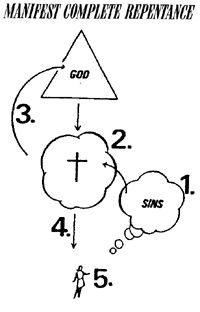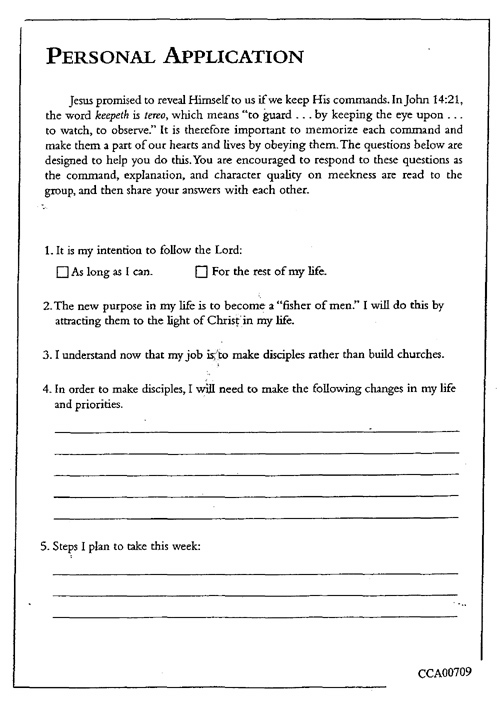The Freedom From Religion Foundation’s federal lawsuit challenging a 24/7 bible-based residential program” at the New Mexico Women’s Correctional Facility in Grants, N.M., is being briefed for judgment by the court.

Typical graphics from Life Principles curriculum used at the women’s prison in Grants, N.M. Notice women’s subordinate position.
|
The Foundation’s brief for partial summary judgment documents how the Christian program was solicited by the State of New Mexico. The state contracts with the Corrections Corporation of America, the nation’s largest for-profit provider of prison services, to run the prison. The contract requires the CCA to provide religious and faith-based programs at the women’s prison in Grants, N.M.
The customized ministry, known as “Life Principles/Crossing Program,” was jointly developed by CCA and the Institute in Basic Life Principles (IBLP). The “Life Principles” program is a standardized residential program intended as a model to be “franchised” in all of CCA’s facilities nationwide.
The prison chaplain coordinates the “Life Principles” program, provides daily supervision and personally runs many activities several times a week, such as the “Prayer Walk.” The chaplain is paid by CCA, and IBLP’s programs are purchased with the prison operating budget. “Life Principles” videos have been shown to the entire prison population, to make known the benefits of the program, at least four times.
IBLP is directed by Bill Gothard, who has an empire of various ministries and is known for his “character” programs. To Gothard, “character” is a loaded word. “Character reveals the Lord Jesus Christ, since He is the full personification of all good character qualities,” instructs the “Life Principles” curriculum used at the Grants prison. The ministry “provides bible studies on 49 character qualities which have amazing correlation to the 49 commands of Christ.” Each trait is defined as being predicated on specific, cited scripture.
Gothard also hawks a “Character First!” program to public schools, cities and local governments, simply removing the explicit biblical references.
Gothard’s stance against all rock music, divorce, and even dating, and his peculiar emphasis on submission to authority are controversial. So is Gothard’s emphasis on “crying out to the God” for salvation, which is distinguished from ordinary prayer. Some Christians describe Gothard’s organizations as “cultlike” or even “spiritually abusive.”
In order to be accepted into the prison program, which offers 30- to 100-day reductions of sentences, female inmates at Grants must first memorize extensive bible verses.

More “Life Principles” graphics
|
The prison ministry” promotes “seven biblical principles” (including instructions to submit to “authority”). According to “Life Principles” textbooks: “The first rule of a successful faith-based program is that the Word of God must be the ultimate priority.”
Segregated inmates awaken to “melodious” religious music. Their days and nights are filled with bible memorization, “curriculum” instruction, and community prayer. A weekly evening service (which “must not conflict with a general population chapel service”) includes hymn-singing, preaching, testimonies and confession of sin, communion, congregational singing, an offering and prayer meeting.
Every aspect of the six-month curriculum involves religious instruction and ritual, including the “mandatory graduation program,” in which the group recites Romans 6, sings a hymn, and which must “conclude in prayer.”
“Character-building” goals include “teaching inmates to be a useful tool in God’s Kingdom,” and “teaching inmates to lay aside their own schedules and preferences in order to please those they serve.” Even a “financial Freedom Seminar” is premised on biblical scripture.

“Life Principles” emphasizes submission to authority
|
The program relies on several “Commands of Christ” workbooks, a bible memorization and meditation journal, and a daily, hour-long guided devotional period known as “Wisdom Search.” Prisoners in the program are expected to “exhort” one another.
The Grants prison ministry incorporates an earlier bible-based program, “Celebrate Recovery,” described as a “Christ-centered recovery program based on the Beatitudes.”
In its motion before the court, the Foundation noted that the program was developed “to guide the offender in the application of biblical principles” and identifies the bible as “the true source of character.”
The CCA Life Principles manual notes that it considers the program a response to the fact that “one of President Bush’s first official acts as President” was to promote public funding of faith-based groups. One text asserts that America “is a God-fearing nation built on biblical principles.”
Attorney Richard Bolton, in the Foundation motion, wrote that it is not lawful for the government to use religion as behavior modification:
“The Establishment Clause . . . does not include an exception based upon the perception of public officials that religion has utility.”
Bolton’s motion continues:
“Public funding of religious activity that indoctrinates or inculcates religion is absolutely prohibited by the Establishment Clause, regardless whether the program is voluntary–and regardless whether nonreligious programs also are funded. The defendants’ argument to the contrary would completely eviscerate the Establishment Clause because virtually no public agency funds exclusively religious activities. The defendants argue, however, that as long as secular programs are also being funded, then the government can also fund explicitly religious content. By this reasoning, religious programs in public schools could be funded if the schools also provide secular programming, such as reading, writing and arithmetic. Churches also could be directly funded to promote church attendance as a means of strengthening the family–as long as secular programs also were funded. The Establishment Clause would have no meaningful existence if the defendants’ argument in support of the “Life Principles/Crossings Program” were accepted. In fact, however, the law is clear that any direct public funding of religious indoctrination is prohibited by the Establishment Clause.
“The Establishment Clause does not include an exception for state-sponsored missionary work in public prisons. Endorsing a state religion, even for locked-up persons, offends the Constitution.”
|
The Life Principles curriculum harps on the godliness of submission to authority, and sanctifies a patriarchal hierarchy.
|
The Freedom From Religion Foundation’s lawsuit, filed a year ago, names Gov. Bill Richardson; Joe R. Williams, Secretary of the New Mexico Corrections Department; Homer Gonzales, coordinator of faith-based programs for the New Mexico Corrections department; Bill Snodgrass, warden, New Mexico Women’s Correctional Facility, and the Corrections Corporation of America.
The Foundation, as a plaintiff, is joined by its crucial New Mexico taxpaying plaintiffs: Martin J. Boyd., M.D., Jesse V. Chavez, and Paul Weinbaum.
The case is FFRF et al v. Secretary Joe R. Williams, Case No. CIV 05-1168, and is in the courtroom of Judge Molzen.

From Series 1, The Curriculum of the Great Commission, “The Commands of Christ,” published by the Institute of Basic Life Principles.
|
Sample of “Life Principles” Indoctrination
The following questions and answers are from the Basic Seminar Follow-Up Course on the “seven basic principles of life”:
Are rulers to execute God’s wrath?
YES.
Does God have direct influence in the decisions of rulers?
YES.
Can we resist God-given authority and still have a good conscience?
NO.
Does God teach that there is a structure of authority in marriage?
YES.
Are we obligated to obey an authority who has an offensive disposition?
YES.
Is it right to join a crowd to forcefully remove a civil person from office?
NO.
Must we continue to respect an evil ruler as a minister of God?
YES.

